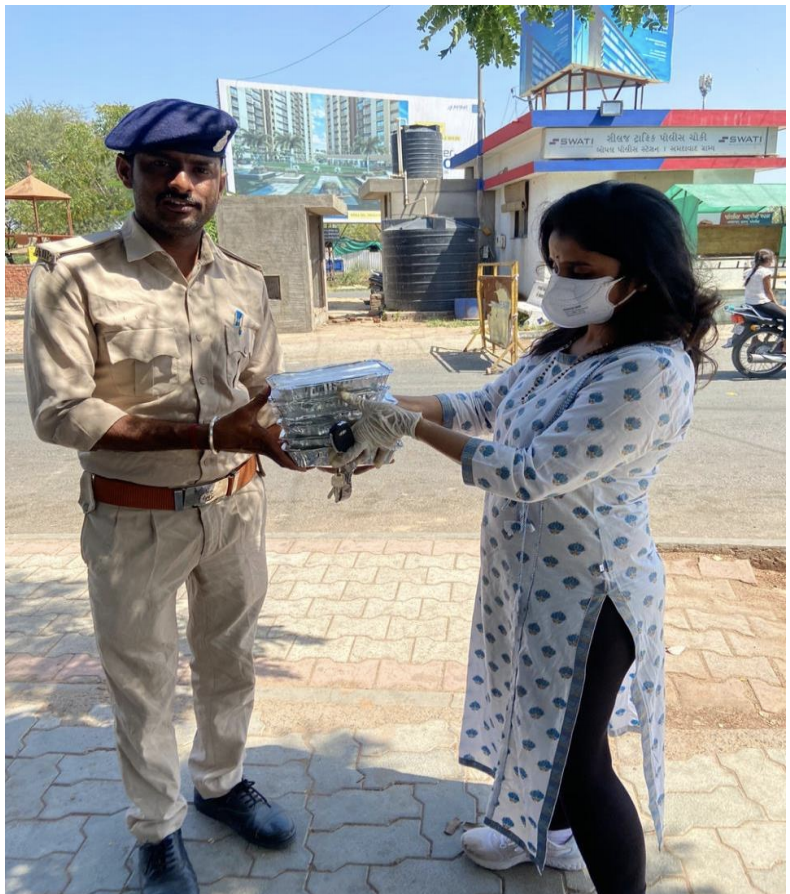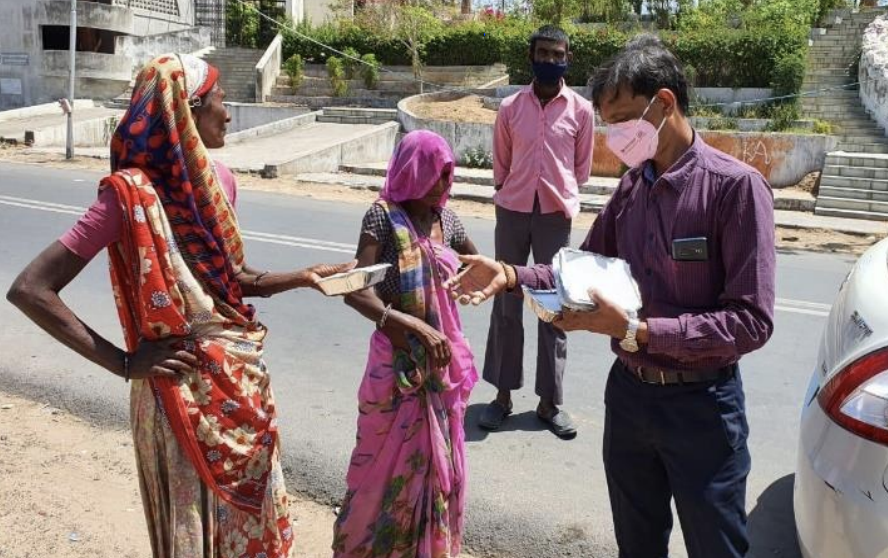
The year 2020 has emphasized one certainty: In times of crisis, entrepreneurs innovate, adapt and continue to give back. One example—among many—of philanthropy during the worldwide COVID-19 crisis comes from our EO Gujarat chapter.
Through their organization, Karma Foundation, members Chiranjiv Patel and Priyanshi Patel led a group of volunteers to feed the homeless and needy during the lockdown in India.
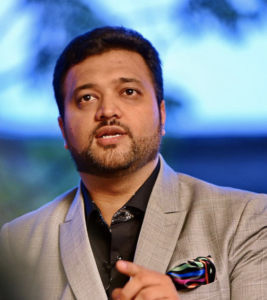 This is just the latest example from many years the Karma Foundation has been making a difference in the community. We recently spoke with Chiranjiv Patel (pictured at left) to learn more. Patel is the managing director and vice chairman of P.C. Snehal Group, a construction company based in Ahmedabad, India. He is known for his leadership in business and charitable pursuits.
This is just the latest example from many years the Karma Foundation has been making a difference in the community. We recently spoke with Chiranjiv Patel (pictured at left) to learn more. Patel is the managing director and vice chairman of P.C. Snehal Group, a construction company based in Ahmedabad, India. He is known for his leadership in business and charitable pursuits.
Tell us more about Karma Foundation.
Karma Foundation is primarily focused on community development across the entire socio-economic spectrum. Our focus includes education, health, livelihood, women development, youth development, literature and culture, and we aim to reach every sector of the society in order to make our efforts more transformational and impactful.
Jeevan Shrishti is one of our main programs. It acknowledges food as a basic necessity. We are working to ensure that nobody goes to sleep with an empty stomach by feeding poor children and the needy. We are also planning to launch kiosks across the city to provide food at negligible cost.
We make food at Sai temple satadhar one day a month and at Anjani Mata temple every day. We distribute food to street people and kids, and also to municipal school students.
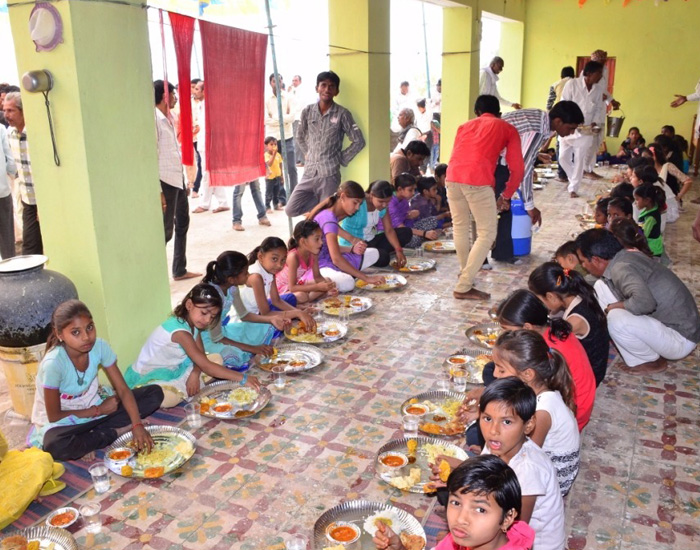 Every week we encounter some of those tear-bringing moments, when Karma feeds 250 people who eat until the last bite of their plate. Some of us go to restaurants every week or maybe twice a week and waste food excessively. But here, they respect the food given on their plates and would not waste even a bite.
Every week we encounter some of those tear-bringing moments, when Karma feeds 250 people who eat until the last bite of their plate. Some of us go to restaurants every week or maybe twice a week and waste food excessively. But here, they respect the food given on their plates and would not waste even a bite.
Since October 2015, we’ve fed approximately 50,000 people.
Other Karma initiatives include:
• Sahara is a program that expresses our core value—support. Through Sahara, Karma extends resources to senior citizens, orphans and abandoned children and other NGOs of the state. I strongly believe that collaboration is the way to drive large scale community transformation.
• Another program is a true example of women empowerment. We believe in the right to cleanliness, or hygiene. Women inmates of Sabarmati Jail manufacture biodegradable and low-cost sanitary pads for underprivileged women and girls.
• The Ahmedabad Book Club is dedicated to literary appreciation and reading, and was formed by EO member Priyanshi Patel. The club has 45,000-plus online members. It provides a platform for online literary discussions and conversations with authors.
• The Science Club encourages adults and children to experience science in new and engaging ways.
There are so many other initiatives we’re working on. I would like to thank the whole Karma team, including volunteers and interns, who support and encourage the soul of the foundation. May we reach our future goals successfully.
How has your work changed since COVID-19 appeared?
COVID-19 closed the entire nation. Even in this hazardous situation, we tried to make 35,000 food packets every day for children and needy.
We would like to thank donors. We are able to run the same cycle every day, and this would not be possible without their donations. It would be just next to impossible. A big thank you to everybody, triggering infinite positivity.
What challenges did you face in delivering meals during the coronavirus shutdown?
We believe that if the spirit inside is bigger than anything else across you, you can win. So we did not consider these big challenges.
Yes, we wondered how in this complete lockdown, people who earn everyday wages to feed their families, how will they manage? For them, it would be like, “bhookh lagi hai, lekin kama ke kha nai sakte” (hungry but can’t eat). In this critical situation, we thought for 24 hours, how we will manage the things? how we will work? how we will all work together at the same place when social distancing is mandatory?
We called up my friend and the volunteers. All 70 volunteers and my friend arrived in the same hour. I would like to salute the volunteers and the core team because in three hours, they prepared 10,750 food packets. 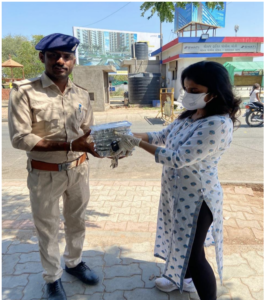 It was very important to follow the requirements of COVID-19. Not only do these rules protect our volunteers and maintain cleanliness while we pack the food, but they also protect the people who are eating from the packets.
It was very important to follow the requirements of COVID-19. Not only do these rules protect our volunteers and maintain cleanliness while we pack the food, but they also protect the people who are eating from the packets.
As we all know, the heat of Ahmedabad is extreme. We arranged fans with sanitizers, so that clean air can be maintained. As there was a national curfew, we needed permission for volunteers to travel. We worked with local police to ensure food reached the right people.
We were determined to put our mark on the city, trying to reach every individual who is suffering, despite the very high expenditure. It costs almost $2,000 to deliver 12,000 food packets every day.
How has EO supported your efforts?
The most important thing EO has taught us is the value of sharing experiences with your peers. EO also teaches us to lead by example.
I made sure that I was present at the camp every day during the 45 days we worked through COVID-19 restrictions—not only managing operations but also packaging food. In spite of having broken leg and plaster on my leg, my spirit did not subside. I was motivated not to miss a single day.
Also, EO chapter members and most of my forum members visited the camp regularly. In this way, EO has also played a prominent role to make this camp successful.
Read more ways the members of EO are making a difference during the COVID-19 global crisis.
Categories: INNOVATION LEADERSHIP Make a Mark WOMEN ENTREPRENEURS

